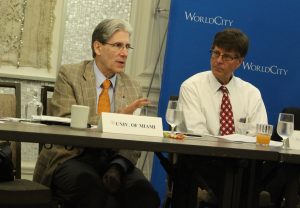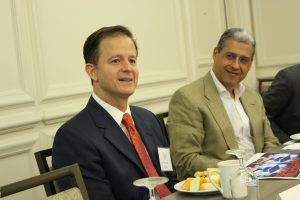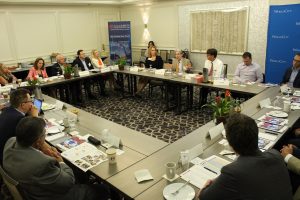Education’s Role in Business Future

University of Miami President Julio Frenk (left) and WorldCity President Ken Roberts (right)
The CEO Club welcomed University of Miami President Julio Frenk, discussing four topics that can help education work with business in Miami, and therefore Latin America: career plasticity, accrediting competencies, tailored education for local businesses and targeting talent.
What an opportunity it is for business to work more closely with higher learning, in particular in Miami, a city that serves as the headquarters for so many of Latin America and the hemisphere’s multinational companies.
UM is a “university that never had a sense of being an ivory tower,” said Frenk. “It was totally connected to the community from day one.”
With that tradition in mind, Frenk spent the first 100 days of his presidency as a listening exercise in 2015, meeting in front of more than 5,000 people and gathering 1,800 suggestions. From that, Frenk made the goal to be HERE, because it’s here in Miami the goals would be achieved:
H-Hemispheric: be in a position to be the hemispheric university
E-Excellent: emphasis on science, technology, engineering and mathematics
R-Relevant: connected to the community (climate change research, for example)
E-Exemplary: embrace diversity
Here’s what the CEO Club discussed on how education and business can work together in the confines of today’s corporate structures to improve Miami and Latin America.
Career Plasticity
“You need to keep reinventing yourself,” said Frenk, using the term Career Plasticity to describe how the workforce will no longer spend entire careers with one company, a common CEO Club theme in 2017. “Universities…need to respond to that.”
Examples of that at UM include executive education and the PETAL program – Platform for Excellence in Teaching and Learning, a platform that allows students to be present while still in the workforce, like UM’s Executive Master’s for Latin American professionals, taught in Spanish, that allows these executives to keep working and not take significant time off to attend classes.
Accredit Competencies

Dominik Bossart (left), SVP global operations LATAM at Brink’s Inc. with Lorena Keough (right), managing director at Diversified Search
Education must adapt to the fast-paced nature of the digital age and allow management and executives to continue their education but complete it in a shorter period of time than universities have been used to. Traditional degree-earning structures will take too long to complete.
“We need to find a mechanism to accredit competencies,” said Lorena Keough, managing director at Diversified Search. “It sounds like something shorter, more precise, more focused, almost like an extension program. You go and get a certificate.”
Keough noted this idea makes so much sense because of the pace in which change is occurring. Flexibility in continuing education is needed more than ever.
Business Partnering with Education

James Faulkner (left), Managing Director and Head of Miami office at Kroll with Edvard Philipson (right), VP Latin America at Ferring Pharmaceuticals
“What can we do as business leaders in Miami to help the university achieve this hemispheric vision?” asked Edvard Philipson, vice president for Latin America at Ferring Pharmaceuticals. “It would be very convenient to hire people coming out of the University of Miami.”
Frenk answered this question in four ways: earlier and expanded internships, deeper interaction with the business community to develop tailored programs, hiring graduates and moving away from federal money for research towards corporate sponsorship.
The last notably would directly put resources towards solving issues and achieving goals needed both for the businesses and community.
The Two Ts
Frenk made the point that finding the right students and future employees must be merit-based, but in Miami that can’t just be about talent. It must also be about temperament.
“You may be a genius, but if you’re a person who for whatever reason doesn’t believe in diversity, for example, you’re going to be uncomfortable (at UM),” said Frenk.
“Sixty percent of the students are international. 10 percent of our first-year students are African-American or African descent from the Caribbean. 19 percent are Hispanic,” Frenk explained. “If you don’t like that, I don’t care if you have the highest GPA. You’re not going to have success in this environment.”
Thanks to our sponsors:
Future WorldCity Events: Save the Date!
September 28-29: 5th annual HR Americas Conference
October 6: next CEO Club
October 20: Trade Connections – 3rd annual National Export-Import Forum
October 27th: Global Connections – The Pulse of Healthcare in Latin America


